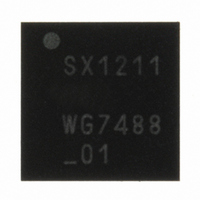SX1211I084TRT Semtech, SX1211I084TRT Datasheet - Page 19

SX1211I084TRT
Manufacturer Part Number
SX1211I084TRT
Description
IC SNGL-CHIP TXRX 32-TQFN
Manufacturer
Semtech
Specifications of SX1211I084TRT
Frequency
860 ~ 960MHz
Data Rate - Maximum
200kbps
Modulation Or Protocol
FSK, OOK
Applications
AMR, ISM, Security and Access
Power - Output
12.5dBm
Sensitivity
-113dBm
Voltage - Supply
2.1 V ~ 3.6 V
Current - Receiving
3mA
Current - Transmitting
25mA
Data Interface
PCB, Surface Mount
Antenna Connector
PCB, Surface Mount
Operating Temperature
-40°C ~ 85°C
Package / Case
32-TQFN
Operating Temperature (min)
-40C
Operating Temperature (max)
85C
Operating Temperature Classification
Industrial
Modulation Type
FSK/OOK
Package Type
TQFN EP
Operating Supply Voltage (min)
2.1V
Operating Supply Voltage (typ)
2.5/3.3V
Operating Supply Voltage (max)
3.6V
Lead Free Status / RoHS Status
Lead free / RoHS Compliant
Memory Size
-
Lead Free Status / Rohs Status
Compliant
Other names
SX1211I084TRT
Available stocks
Company
Part Number
Manufacturer
Quantity
Price
Company:
Part Number:
SX1211I084TRT
Manufacturer:
HITTITE
Quantity:
560
In OOK mode, the phase difference between the I and Q channels is kept constant (independent of the transmitted
data). Thus, the first stage of up-conversion creates a fixed frequency signal at the low IF = Fdev (This explains
why the transmitted OOK spectrum is offset by Fdev).
OOK Modulation is accomplished by switching on and off the PA and PA regulator stages. By convention:
After the interpolation filters, a set of four mixers combines the I and Q signals and converts them into a pair of
complex signals at the second intermediate frequency, equal to 1/8 of the LO frequency, or 1/9 of the RF
frequency. These two new I and Q signals are then combined and up-converted to the final RF frequency by two
quadrature mixers fed by the LO signal. The signal is pre-amplified, and then the transmitter output is driven by a
final power amplifier stage.
In Continuous transmit mode, setting the Bit Rate is useful to determine the frequency of DCLK. As explained in
section 5.3.2, DCLK will trigger an interrupt on the uC each time a new bit has to be transmitted.
Bit rate, frequency deviation and TX interpolation filter settings are a function of the reference oscillator crystal
frequency, F
the correct reference oscillator frequency. Please contact your local Semtech representative for further details.
The frequency deviation, Fdev, of the FSK transmitter is programmed through bits MCParam_Freq_dev:
For correct operation the modulation index ß should be such that:
It should be noted that for communications between a pair of SX1211s, that Fdev should be at least 33 kHz to
ensure a correct operation on the receiver side.
Fdev has no physical meaning in OOK transmit mode. However, as has been shown - due to the DDS baseband
signal generation, the OOK signal is always offset by “-Fdev” (see formulas is section 3.2.8). It is suggested that
Fdev retains its default value of 100 kHz in OOK mode.
Rev 7 – Sept 2
ADVANCED COMMUNICATIONS & SENSING
3.3.2. Bit Rate Setting
3.3.3. Alternative Settings
3.3.4. Fdev Setting in FSK Mode
3.3.5. Fdev Setting in OOK Mode
nd
XTAL
, 2008
. Settings other than those programmable with a 12.8 MHz crystal can be obtained by selection of
Fdev
BR
32
64
*
DATA
DATA
1
*
1
val
Page 19 of 92
2
val
(
*
'
' '
MCParam
' ' 1 '
' ' 0
(
Fdev
F
MCParam
BR
⇒
F
⇒
XTAL
XTAL
PAon
PAoff
2
_
Freq
_
BR
_
)
dev
)
www.semtech.com
SX1211













